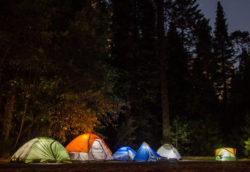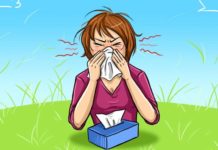An allergy is caused due to a foreign substance called allergen reacting to your immune system. Seasonal Allergies can be triggered because of something you eat, inhale into your lungs or touch or inject into your body. If you sneeze, cough or your eyes are itchy and running itchy nose during certain times of the year; you may have seasonal allergies. Grass pollen and molds are the most common triggers of seasonal allergies. In severe cases, it can cause rashes, low blood pressure, hives, breathing troubles, asthma attack or even death.

Quick Facts About Seasonal Allergies:
- Researchers think about 50 million people are affected by nasal allergy in the United States.
- The count has been increasing, and there are as many as 40 percentages of children and 30 percent of adults affected by it.
- The 6th leading cause of chronic illness in the United States is allergies.
- The most common health issue faced by children in the United States is allergic conditions.
- About 200,00 times each year people visit the emergency room as a result of food allergies. People who stay in hospitals amount to almost 10,000 per year because of the allergies caused by foods.
- The yearly cost of allergy in the United States exceeds $18 billion. And accounting the food allergies, the cost soars to about $25 billion each year.
- Allergic rhinitis and other allergic diseases like asthma or food allergy and eczema are most common in all the age groups in the United States, with Asthma affecting the largest over 17 million adults and more than 7 million children.
- Allergic rhinitis also known as hay fever is a common condition too in the people in the United States with common symptoms of sneezing, running or stuffy nose, watery eyes, and itchy nose, eyes or the roof of the mouth.
- Allergic rhinitis can either be perennial or seasonal.
- Largest symptoms of seasonal allergic rhinitis happen in spring, summer and/or early fall. They are usually induced by allergic sensitivity to pollen from trees, weeds, grasses or to airborne mold spores.
- People experience signs of perennial allergic rhinitis year-round. Sensitivity to house dust mites, animal dander, cockroaches or mold spores causes Perennial allergic rhinitis. Perennial nasal symptoms are rarely induced by Underlying or hidden food allergies.

What are the Common Seasonal Allergy Triggers:
Most of the parts in the United States have spring allergies starting in the month of February and lasts until the early summer. Moderate winter temperatures can lead to early pollination in plants. During the rainy spring seasons, rapid plant growth may be promoted leading to growth in the mold, causing seasonal allergy symptoms to last well into the fall.
While the severity and timing of the seasonal allergy can vary in a country, the climatic factors that can influence the Symptoms of seasonal allergies:
- Ragweed pollens, trees, grass during cool nights and warm days.
- A combination of humidity and heat gives the best condition for the molds to grow quicker.
- In the mornings, the pollen levels tend to be at peak.
- The pollen counts can soar after rainfall.
- airborne allergens are usually grounded on a day with no wind.
- windy and warm days result in a pollen counts surge.
- Allergens are virtually everywhere, so as natural ways to treat seasonal allergy, changing place is not very effective.
Ragweed is the most common reason for causing seasonal allergies. It is a plant that grows wild almost all over, but more commonly found on the Eastern Coast and in the Midwestern regions of United States. August to November is the main season for the ragweed to bloom releasing the pollens. Mid-September is considered the highest for the Ragweed pollens to spread.
Other plants that trigger fall allergies causing seasonal allergies symptoms are:
- Burning bush
- Cocklebur
- Lamb’s-quarters
- Pigweed
- Sagebrush and mugwort
- Tumbleweed and Russian thistle
The days are shorter during the winters limiting the length of this grass season and they enter short dormancy duration right before Thanksgiving. Nearly the whole of the U.S. is blessed during Christmas with few outdoor allergens in the environment. However, as soon as the new year sets in, the seasonal allergy cycle starts all over again.

Seasonal Allergies Treatment or Seasonal Allergy Remedies:
To fight seasonal allergies, firstly you must know your triggers. You may assume pollen to be the cause of your suffering, but other matters may be involved as well. An allergist should be able to help you find the origin of your suffering and help to provide seasonal allergy relief overall.
Although spring season could be beautiful for many, the suffering from seasonal allergies makes it misery for others. Natural ways to help allergies is one of the most effective seasonal allergies remedies.
- You can always monitor pollen and mold counts via the weather reports in newspapers or online or even on the radio and television during allergy seasons.
- You must keep the windows and doors of your house shut and also take precautions while driving in the car.
- Try to know which pollen affects you, and you are sensitive to. Try to avoid it and keep a check on the pollen counts.
- Maintain proper hygiene by taking a shower regularly, washing your hair and wearing a fresh and clean set of clothes once you are back from outdoors.
- Eating healthy is another way to keep your immune system at its peak. Children who eat a lot of fresh green vegetables and fruits also nuts have had fewer allergy symptoms. Grapes, oranges, tomatoes, apples, etc. are particularly good for health.
- Wear a NIOSH-rated 95 filter mask(R) while doing most of your outdoor or household chores.
- By practicing to rinse the nasal cavity helps to clean mucus out of your nose and eases the allergic symptoms.
- Drink more of water, juice or any non-alcoholic drinks if you feel stuffy or have nasal drips from your allergy. The extra liquid intake helps to dilute the mucus and provides some relief. Tea, broth, soup or any hot beverages can help.
- Inhaling some steam might help to relieve the stuffy nose and helps you to breathe easier.
- Avoid cigarette smoke as that only worsens the itchy feeling on the nose and watery eyes.
- Acupuncture(R) helps to get some relief.
There may be some more medications that your allergist might recommend you to control the seasonal allergy symptoms. Follow them as per the dosage, some would be the nasal drops and might require a prescription or few drugs which are available without a prescription. If you have a history of seasonal allergies, the doctors suggest starting medications to relieve the allergic symptoms about two weeks prior to their expected start out.








































